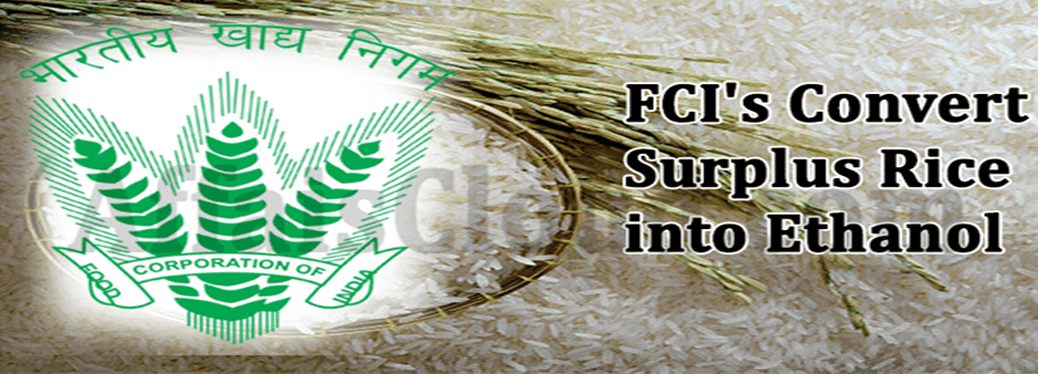CONVERSION OF SURPLUS RICE TO ETHANOL
25, Apr 2020

Prelims level : Governance - Policies
Mains level : GS-III Achievements of Indians in science & technology; indigenization of Technology and developing New Technology.
Why in News?
- Recently, the Central government has allowed the conversion of surplus rice to ethanol.
Key Points:
- Ethanol produced from the excess rice will be used for utilisation in making alcohol-based hand sanitizers and blending in petrol. Ethanol is one of the most variable alternatives amongst biofuels.
- The National Biofuel Coordination Committee(NBCC) took the decision which will lead to utilisation of part of a huge stockpile of 30.57 million tonnes (MT) of rice which is almost 128% more than the buffer stock and strategic requirement norms.
- At present, the Food Corporation of India (FCI) has huge rice stock from previous years excluding the unmilled paddy lying with millers on behalf of FCI.
- Using surplus rice for ethanol will address the concern of about 750 million litres of grain-based distillery capacities lying idle, due to the lack of feedstock.
- The National Policy on Biofuels, 2018 allows conversion of surplus quantities of food grains to ethanol when there is a projected oversupply of food grains.
Criticism on Government’s Move:
- This move has been criticised on the grounds that how can the government waste food stock for fuel when the considerable number of the population doesn’t have food and is suffering from malnutrition.
- In recent past, the government decided to give 5 kg wheat or rice and 1 kg of preferred pulses free of cost to 800 million people, under the National Food Security Act, 2013 (NFSA) in the wake of the Covid-19 pandemic.
- However, many poor people are unable to get the benefit out of it, due to loopholes in the PDS network. For example, a large chunk of ration card holders may not be eligible for the free grains, as they are not covered under the NFSA.
- The NFSA, based on the 2011 census, had not factored in the population increase in over nine years, leaving a huge number of people out of its ambit.
About National Policy on Biofuels, 2018:
- It expands the scope of feedstock for ethanol production and has provided for incentives for production of advanced biofuels.
- It categorises biofuels in various categories to enable extension of appropriate financial and fiscal incentives under each category.
- Basic Biofuels or First Generation (1G):Bioalcohols, Biodiesel, etc.
- Second Generation (2G) or Advanced Biofuels:Ethanol, Municipal Solid Waste (MSW) to drop-in fuels, etc.
- Third Generation (3G):
- Fourth Generation (4G):Fuel from genetically engineered crops.
- It expands the scope of raw material for ethanol production by allowing use of sugarcane juice, sugar containing materials like sugar beet, sweet sorghum, starch containing materials like corn, cassava, damaged food grains like wheat, broken rice, rotten potatoes which are unfit for human consumption.






